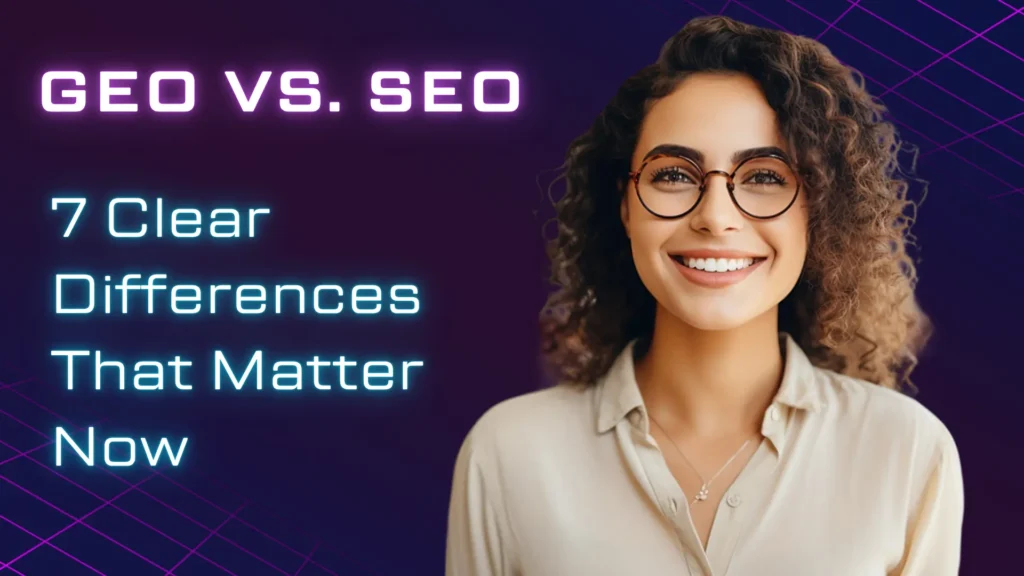Let’s not overcomplicate this. SEO has been the go-to playbook for getting found online. But AI just changed the rules.
We’re now in GEO territory. That’s Generative Engine Optimization. And it works differently. If you’re still optimizing for traditional keywords alone, you’re leaving visibility on the table.
Here’s the thing: GEO isn’t some small tweak to SEO. It’s a shift in how discovery happens. Let’s break it down.
1. Machines Are Doing the Searching Now
In SEO, you optimize for humans typing into Google.
In GEO, you’re optimizing for machines, specifically, large language models (LLMs) like ChatGPT, Perplexity, or Google’s Gemini. These AI tools are doing the searching for users. They’re the middlemen now.
That means you’re no longer just convincing humans. You’re training machines to understand, surface, and trust your content.
2. LLMs Don’t Use Keywords Like Humans Do
SEO thrives on keywords: “best hiking boots,” “cheap laptops under $500,” that kind of thing.
GEO? Different game.
LLMs don’t search with keywords the way people do. They process natural language, interpret intent, and run multiple-layered queries under the hood.
Your prompt might be:
“What’s the best laptop for video editing under $1000 with long battery life?”
The LLM pulls in all the context, price, use case, battery, performance, and fires off several sub-queries to check for relevance, quality, and context. That’s not keyword matching. That’s concept matching.
3. Most Websites Aren’t Ready for These Queries
Here’s the problem: most sites are still optimized for traditional keyword searches.
But AI search doesn’t care if you’re ranking on page one of Google. Recent data shows that being in the top 10 search results gives you only about a 30% shot at being cited by an AI engine.
Why? Because your content was built to please Google’s crawler, not a language model interpreting broad semantic intent.
4. Chunking for Citations ≠ GEO
There’s buzz around “chunking” your content, breaking it up into short, referenceable pieces, to get cited by AI.
That’s fine if your goal is brand mentions. But citations in knowledge-based answers don’t drive buyer traffic.
GEO isn’t about passive mentions. It’s about visibility in high-intent scenarios. That means optimizing your products, services, and landing pages for how AI responds to actionable prompts like:
“Where can I buy eco-friendly paint near Boston with same-day delivery?”
Being useful to that kind of query is GEO. Getting cited in a history essay answer is not.
5. GEO and E-E-A-T Have a Lot in Common
Let’s talk trust. Google introduced E-E-A-T (Experience, Expertise, Authoritativeness, Trustworthiness) to reward helpful, reliable content.
The same applies in GEO.
If your content, products, and business pages signal authority and trust, AI models are more likely to include you in their responses. But GEO pushes this further, it focuses on making everything about your business more discoverable: product descriptions, FAQs, shipping policies, reviews, and even your About page.
It’s not just about traffic. It’s about conversion-ready visibility.
6. Your Business Probably Needs an AI Readiness Test
AI isn’t doubling slowly. It’s accelerating fast.
Every six months, we witness significant advancements in how AI understands content and responds to prompts. If your business isn’t showing up in AI-driven answers, you’re getting missed entirely.
You need to audit how LLMs are interpreting your brand. Is your content clear, structured, trustworthy, and useful to a machine?
Because if it isn’t, someone else’s is.
7. The Customers Are Still Searching, Just Not on Google Alone
Let’s wrap with a real-world example.
Imagine you’re in London on a hot day, just toured Buckingham Palace, and you’re craving a traditional English pub that also happens to serve great salads (with reviews to back it up).
Old-school search:
“Pubs near me”
…then scrolling through options, checking menus, checking reviews. Takes time.
AI search:
“I’m near Buckingham Palace, want a pub with great salads and good reviews.”
Boom, answer delivered in seconds. Context understood. Decision made.
That’s GEO at work.
It looks at everything, your menu, your location, your reviews, your delivery options, and connects you to the right query at the right moment.
Bottom Line
GEO isn’t a trend. It’s the next phase of visibility.
SEO got you to page one. GEO gets you in the answer.
If you’re not building for how AI discovers and recommends content, someone else will.

I’m Nitin Pandey, an SEO expert with 5+ years of experience helping brands grow online through smart digital marketing, higher Google rankings, and results-driven strategies that work.


